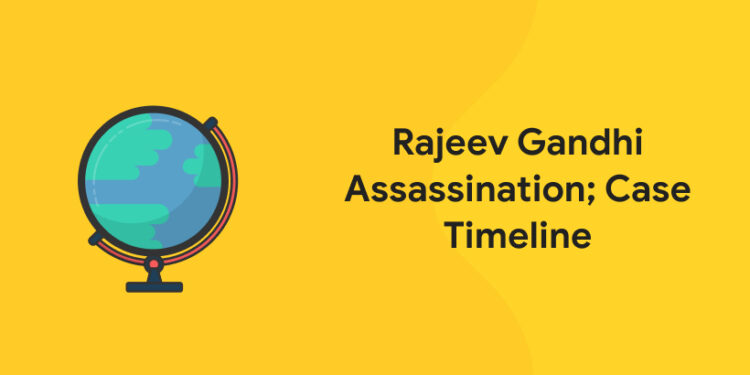As you are aware, in a landmark verdict, the supreme court released AG Perarivalan, a convict of the Rajeev Gandhi assassination case, 31 years after his arrest in 1991.
The bench headed by Justice L Nageswara Rao Justices L Nageswara Rao, BR Gavai, and AS Bopanna invoked its extraordinary power under Article 142 to deliver “complete justice” and to grant relief to Perarivalan instead of referring his remission appeal to the governor.
Attempt GK Mock Test! Download Entri App now!
Here’s a timeline of events in the Rajiv Gandhi case;
May 21, 1991: Rajiv Gandhi, the former Prime Minister of India, was assassinated at Sriperumbudur at 10.20 pm. Dhanu (Thenmozhi Rajarathinam), a female assassin of Liberation Tigers of Tamil Eelam (LTTE), trigged a belt bomb and killed Gandhi and 16 others, around 45 persons were critically injured.
May 11, 1991: A CB-CID squad was constituted to investigate the case.
May 24, 1991: On request of the state government, under the President’s Rule, the investigation was handed over to a Special Investigation Team (SIT) of the Central Bureau of Investigation (CBI).
June 11, 1991: CBI arrests 19-year-old A G Perarivalan, charged with Terrorism and Disruptive Activities (Prevention) Act (TADA) in Chennai. He was accused of supplying two nine-volt batteries to Sivaraman, later used to trigger the belt bomb that killed Rajiv Gandhi. He was also charged for purchasing a motorcycle in his name but provided the wrong address.
May 20, 1992: SIT submitted the charge sheets for 41 accused, including 12 dead, and three abscondings, before a special TADA trial court in Chennai.
January 28, 1998: After a prolonged trial, the court sentenced the death penalty to Perarivalan and 25 others for their involvement in assassinating Rajiv Gandhi.
May 11, 1999: The Supreme Court upheld death sentences to the four of seven accused, including Murugan, Shanthan, Perarivalan, and Nalini, and three others commuted to life sentences while acquitting 19 other death convicts.
Attempt GK Mock Test! Download Entri App now!
April 2000: Nalini’s death penalty was commuted to life imprisonment by the Tamil Nadu governor based on the proposal proposed by the state cabinet and a public appeal by Sonia Gandhi.
2001: Three death convicts, including Santhan, Murugan, and Perarivalan, submit mercy petitions to the President of India.
August 11, 2011: Prathibha Patil, the president of India, rejected their mercy plea after 11 years.
August 2011: The Madras High Court stayed the execution of the three death convicts who were to be hanged on September 9, 2011. Also, the Chief Minister, late J Jayalalitha, passed a resolution seeking the commutation of the death sentence.
February 24, 2013: Justice K T Thomas, who headed the Supreme Court in 1999, raised the question of ‘double jeopardy,’ saying that hanging them after 23 years would be unconstitutional. “This appears to be a third type of sentence, something which is unheard and constitutionally incorrect. If they are hanged today or tomorrow, they will be subjected to two penalties for one offense,” he said.
November 2013: Former CBI Special Agent V Thyagarajan, who took Perarivalan’s confession in TADA custody, says it was changed to qualify as a confession. “Perarivalan never stated that he knew the battery he bought would be used to make bombs,” he said.
January 21, 2014: SC commutes the death penalty of three convicts.
2015: Perarivalan submitted a mercy petition to the governor of Tamilnadu pursuing release under Article 164 of the Indian constitution.
August 2017: The Tamil Nadu government awards parole to Perarivalan for the first time after his arrest in 1991.
September 6, 2018: Due to the Tamil Nadu governor’s excessive delay, The Supreme Court has claimed that the Governor has the authority to decide on Perarivalan’s remission petition.
September 9, 2018: The Tamil Nadu government, led by then-Chief Minister Edappadi K Palaniswamy recommended the release of all seven suspects.
May 2021: Perarivalan is out on parole. The new DMK government upheld extending the parole.
March 9, 2022: The Supreme Court grants bail to Perarivalan.
May 11, 2022: The Supreme Court concludes the hearing in the case.
May 18, 2022: The supreme court released Perarivalan 31 years after his arrest.
Conclusion
The release of A.G. Perarivalan, one of the convicts in the assassination of former prime minister Rajiv Gandhi, has turned the limelight on the others convicted in the case. Six other convicts, including Murugan alias Sriharan, Nalini Sriharan, T. Suthenthiraraja alias Santhan, Robert Pious, and Jayakumar, have been serving life imprisonment sentences in prisons in India. The verdict 31 years later is a source of hope for them.
Attempt GK and current affairs mock test! Download Entri App!














